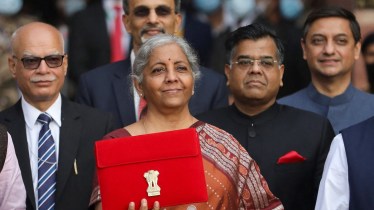In a noteworthy move to stimulate India’s electronics sector, Finance Minister Nirmala Sitharaman unveiled the 2024 Union Budget with a focus on reducing the Basic Customs Duty (BCD) on mobile phones, mobile printed circuit board assemblies (PCBA), and chargers. The new budget slashes the BCD by up to 15 percent, aiming to make smartphones more affordable and bolster local manufacturing.
Sitharaman’s announcement is a pivotal step in supporting the “Make in India” initiative, which is expected to lower production costs for original equipment manufacturers (OEMs) and promote domestic manufacturing. This reduction in import duties comes after last year’s similar tax cuts on key components such as camera lenses and lithium-ion batteries, which also aimed to boost the local production of smartphones and electric vehicles.
Muralikrishnan B, President at Xiaomi India, welcomed the tax reduction, highlighting that it will strengthen the domestic electronics manufacturing ecosystem. “We welcome the Budget 2024 announcement to reduce BCD on mobile phones, PCBA, and chargers, while simultaneously extending exemptions on inputs/raw materials for smartphone manufacturing,” Muralikrishnan stated. He added that Xiaomi India’s commitment to local manufacturing and sourcing components like PCBA and charging cables will be further supported by these measures. The focus on increasing women’s workforce participation and employment-linked incentives for first-time employees is also seen as a boost to consumer spending, including the demand for smartphones.
Arijeet Talapatra, CEO of Transsion India, echoed similar sentiments. “Transsion India welcomes the Ministry of Finance’s decision to reduce the basic customs duty from 20% to 15% on mobile phones, mobile PCBA, and chargers. This policy change will benefit both manufacturers and consumers, fostering a more competitive smartphone market and strengthening our position in the global market,” Talapatra remarked. He expressed confidence that the new measures will make smartphones more affordable and align with the ‘Make in India’ initiative.
The budget also includes provisions for increased duty on PCBAs for specific telecom equipment by 10-15%, which reflects the government’s commitment to strengthening local manufacturing capabilities in crucial sectors. Tilak Raj Dua, Director General of the Digital Infrastructure Providers Association (DIPA), praised the focus on enhancing Digital Public Infrastructure (DPI) as a means to accelerate India’s economic growth.
However, the 2024 budget left some sectors expecting more. A. Gururaj, Managing Director of Optiemus Electronics Ltd., noted the positive impact of the tax cuts and the emphasis on manufacturing but expressed concern that certain sectors, such as television manufacturing, were overlooked. Gururaj also highlighted the importance of skilling initiatives and employment incentives in supporting the expanding electronics manufacturing industry.
In contrast to last year’s budget, which featured significant announcements for artificial intelligence (AI) and 5G technology, this year’s budget did not address these areas directly. Rajiv Lamba, Founder of SurveySensum, pointed out that while the budget includes positive elements like the abolition of angel tax and support for deep tech innovation, it lacks specific initiatives for ongoing AI development. Lamba emphasised the need for targeted upskilling programs and accessible funding for AI startups to drive future growth.
Arjun Bajaj, Director at Videotex, expressed mixed feelings about the budget. While acknowledging the budget’s emphasis on manufacturing and infrastructure, Bajaj noted that the television manufacturing sector felt somewhat neglected. Despite this, he remained hopeful that the focus on skilling and workforce development would foster future growth in the manufacturing sector.
